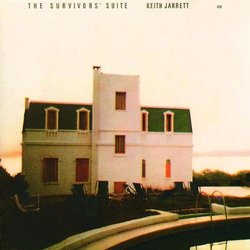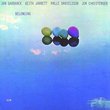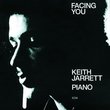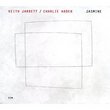| All Artists: Keith Jarrett Title: Survivor's Suite Members Wishing: 3 Total Copies: 0 Label: ECM Records Original Release Date: 1/1/2000 Re-Release Date: 5/9/2000 Genres: Jazz, Pop Styles: Avant Garde & Free Jazz, Modern Postbebop, Bebop Number of Discs: 1 SwapaCD Credits: 1 UPC: 042282713124 |
Search - Keith Jarrett :: Survivor's Suite
 | Keith Jarrett Survivor's Suite Genres: Jazz, Pop
Keith Jarrett's prolific quartet work during the 1970s had lots of peaks, from his Nordic band's Belonging to his U.S.-based band's entire Impulse! output (now available on two excellent multi-CD sets, The Impulse Years: 1... more » |
Larger Image |
CD DetailsSynopsis
Amazon.com essential recording Keith Jarrett's prolific quartet work during the 1970s had lots of peaks, from his Nordic band's Belonging to his U.S.-based band's entire Impulse! output (now available on two excellent multi-CD sets, The Impulse Years: 1973-1974 and Mysteries: 1975-1976). This 1977 date, featuring the U.S. lineup of Jarrett and tenor saxophonist Dewey Redman, bassist Charlie Haden, and drummer Paul Motian, also highlighted Jarrett's soprano saxophone, celeste, bass recorder, and percussion across the span of two lengthy 20-plus-minute segments of the Survivors' Suite. Slow developments intensify the music's length, both harmonic and melodic, as it builds toward cresting and busting points and recedes again into remarkably sensitive, quiet solos and duos between the group's players. Haden and Jarrett (on Celeste) play a stellar duet to usher in the closing movement from the first segment, and, as always, Redman plays with a biting intensity and a Texas-blues yearning that's as wide and long as the Lone Star state. --Andrew Bartlett Similar CDs
|
CD ReviewsA Masterpiece... A. Davis | Greenville, SC | 07/12/2002 (5 out of 5 stars) "It is a personal requirement that I listen to this recording at least once a month. This music takes me to places I have never been before and I always return with a refreshed point of view. Jarratt & company explore the full range of human emotions on this beautiful masterpiece. From a soft and tender relaxing vibe to a full blown controlled rage, this music parallels the experience of life - its'ups and downs and ebbs and flows. It is something to experience often. The long winding suite starts out slow, builds to a boil and then mellows out before exploding into what can only be described as an emotional storm. When the music final ends, you have been through an emotional roller-coaster. I have over 25 Jarratt recordings in my collection and each one offers a diverse and unique listening experience, but this one goes to the proverbial desert island with me along with Wayne Shorter's "Native Dancer" and Miles Davis' "Kind of Blue. This recording is appropriately titled "Survivors Suite," because if you "get it" you will be completely exhaused after you "survive it" - but you will have a big smile on your face when you finish. After almost 25 years, this music is still fresh and exciting. Thanks for the experience Keith. Peace!" Transcendent Gavin Wilson | 02/17/2004 (5 out of 5 stars) "In my CD collection, I have many from the 70s and 80s whose qualities diminish each time I pull them out for another spin. ("What on earth did I see in that one??" is a familiar lament.) Not the SURVIVOR'S SUITE. I must have played it a thousand times over the years, and each time I hear new things in this outstanding album. It's the usual purchase history: taped it off a friend at uni in 1977, persuaded my brother to buy it on LP in the vac, bought my own copy of the CD in the 80s, still waiting for ECM to reissue on SACD (or at least remastered) in the 00s. Not for nothing was this voted the Melody Maker's Jazz Album of the Year in 1977. I just finished playing it again today, and my area of intrigue is another tiny detail: was it over-dubbed? This would be unusual for a Jarrett album, but there are passages where Jarrett appears to be playing both soprano sax and bass recorder. (And you thought this was going to be just another piano album?!) The extraordinary thing about this album -- which has always been in my all-time Top Ten -- is that there are passages which I regard as almost unlistenable. But those noisy, free-jazz sections serve only to accentuate the total beauty of the quiet pieces which follow them. There is so much going on in this album. There's more than a hint of world music. Paul Motian's drum-playing is extraordinary, and a source of inspiration for anyone worried that their creativity might dry up in the forties. Haden's bass is fantastic -- utterly dependable whenever Jarrett needs to swing, yet rich in emotion when required to perform a solo or the closing coda of each track. Redman, though primarily a saxophone player, actually gets to play more percussion than sax on this album. Jarrett's piano -- particularly those long right-hand runs -- has never been better, but here he experiments with several other instruments -- soprano sax, osi drums (whatever they are), celeste and bass recorder. This is the album that got me into jazz. It takes time to get into. My recommendation is to start by listening repeatedly to the rest of track #2 after Motian's drum solo. Once 'into' this album, you will treasure it for life. I've known it for 27 years, and it never palls." A little different G B | Connecticut | 04/15/2005 (4 out of 5 stars) "This album is the best-known of the dozen or so recorded by Keith Jarrett's American Quartet, probably due to the fact that it appears on the same label as his most popular work (ECM). Though the group was often supplemented by one or two percussionists, only the group's core of Jarrett, Dewey Redman, Charlie Haden and Paul Motian appears here. It was recorded near the end of the group's 6 year life, and is arguably the last great album the group recorded. (They'd go on to record Bop Be and Byablue for Impulse, and the disappointing Eyes of the Heart for ECM.)
It's also, without a doubt, the most compositionally ambitious and dense album Jarrett made with this lineup. It's different in tone than their other albums -- there isn't too much of the free-wheeling looseness, funky gospel roots, vibrant swing, or general sense of fun that characterizes those recordings. Other elements of the group's sound appear here -- cascading rubato ballads (two of them on "Beginning"), the world-music-flavored collective improvisation that opens the album, free jazz (the first few minutes of "Conclusion"), and interplay between Redman's tenor and Jarrett's soprano saxophones. The suite even recycles a theme from an earlier album ("Great Bird", from Death and the Flower), though it's given a very different reading here. These elements might surprise someone who comes in expecting the Jarrett of the European Quartet, the Standards Trio or the marathon solo concerts. As far as the performances, Dewey Redman is superb here. He gets four or five excellent solos, and his intense wailing over the rumbling rhythm section in the last few minutes is my favorite part of the album. Listening to his playing here reminds me what a great saxophonist he is -- Amazon's description of the "Texas-blues yearning that's as wide and long as the Lone Star state" is perfect. I think Jarrett has better performances on piano elsewhere, and with one small exception the Haden-Motian tandem never manages to cut loose like they do on other albums. Also, very annoyingly, Jarrett overdubbed a breathy bass recorder bit all over the album. I don't think this is the group's best album -- it doesn't reach the peaks of their best work on Impulse, and I'd personally rather listen to Fort Yawuh, Mysteries or Backhand. (For a bite-sized sample of the Impulse work, check out Fort Yawuh. Otherwise spring for the two box sets that include all the group's work.) On the other hand, if you like Jarrett's more "serious" work on ECM then you might actually prefer the Survivor's Suite. Either way, it's definitely worth picking up and enjoying." |

 Track Listings (2) - Disc #1
Track Listings (2) - Disc #1

